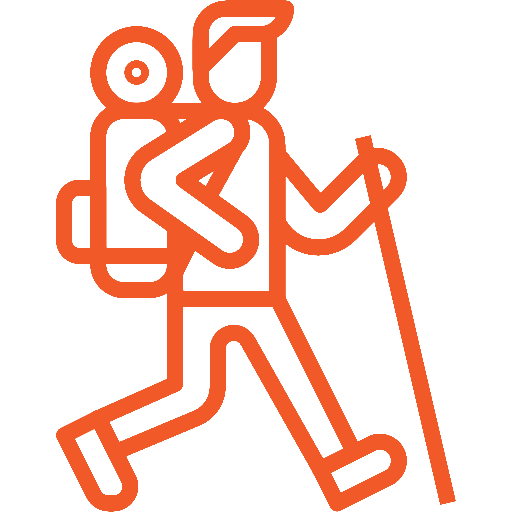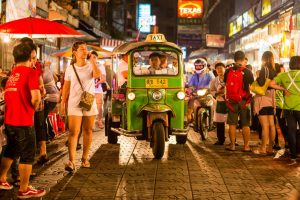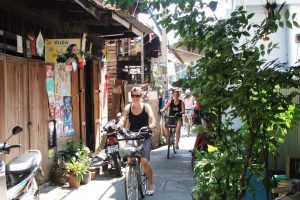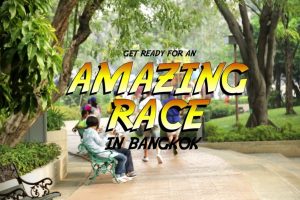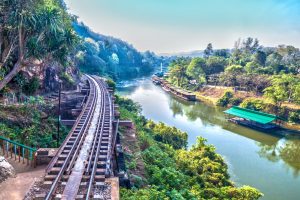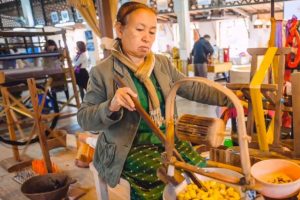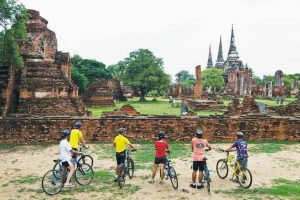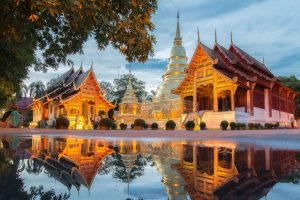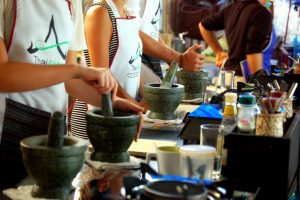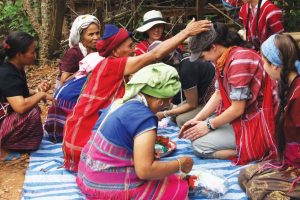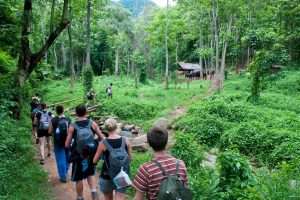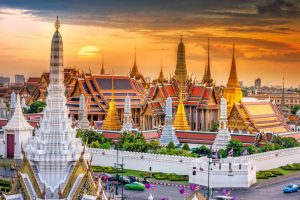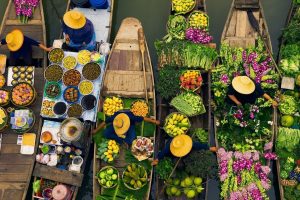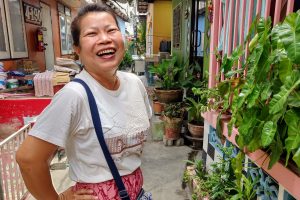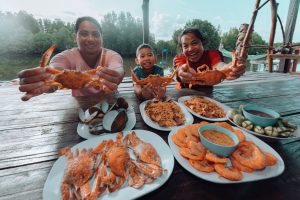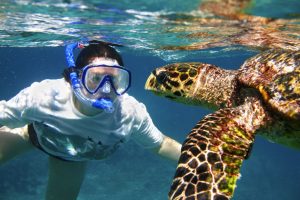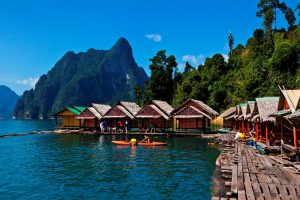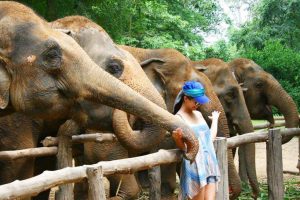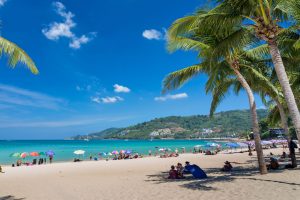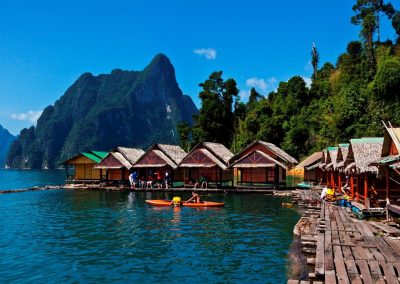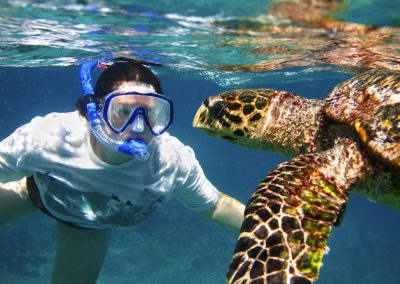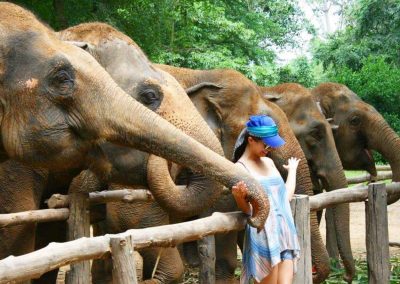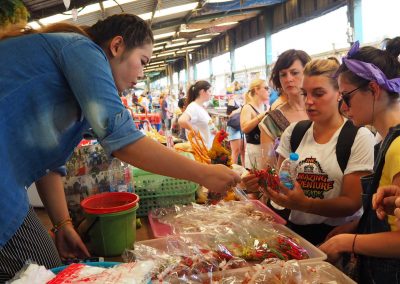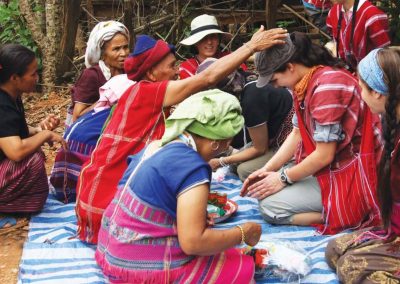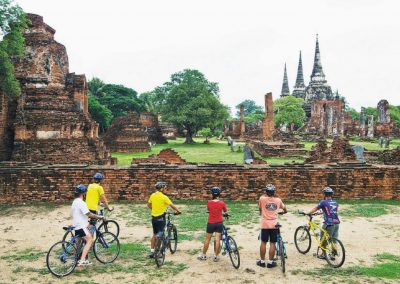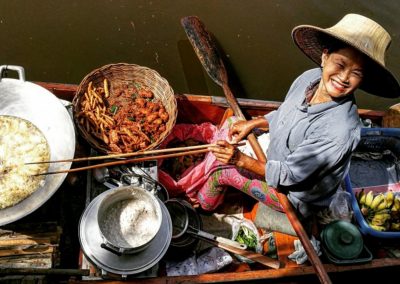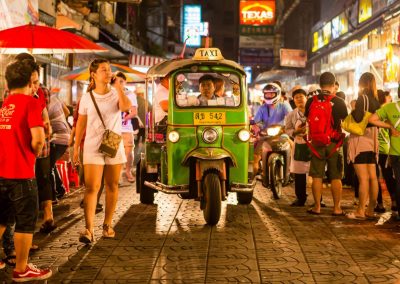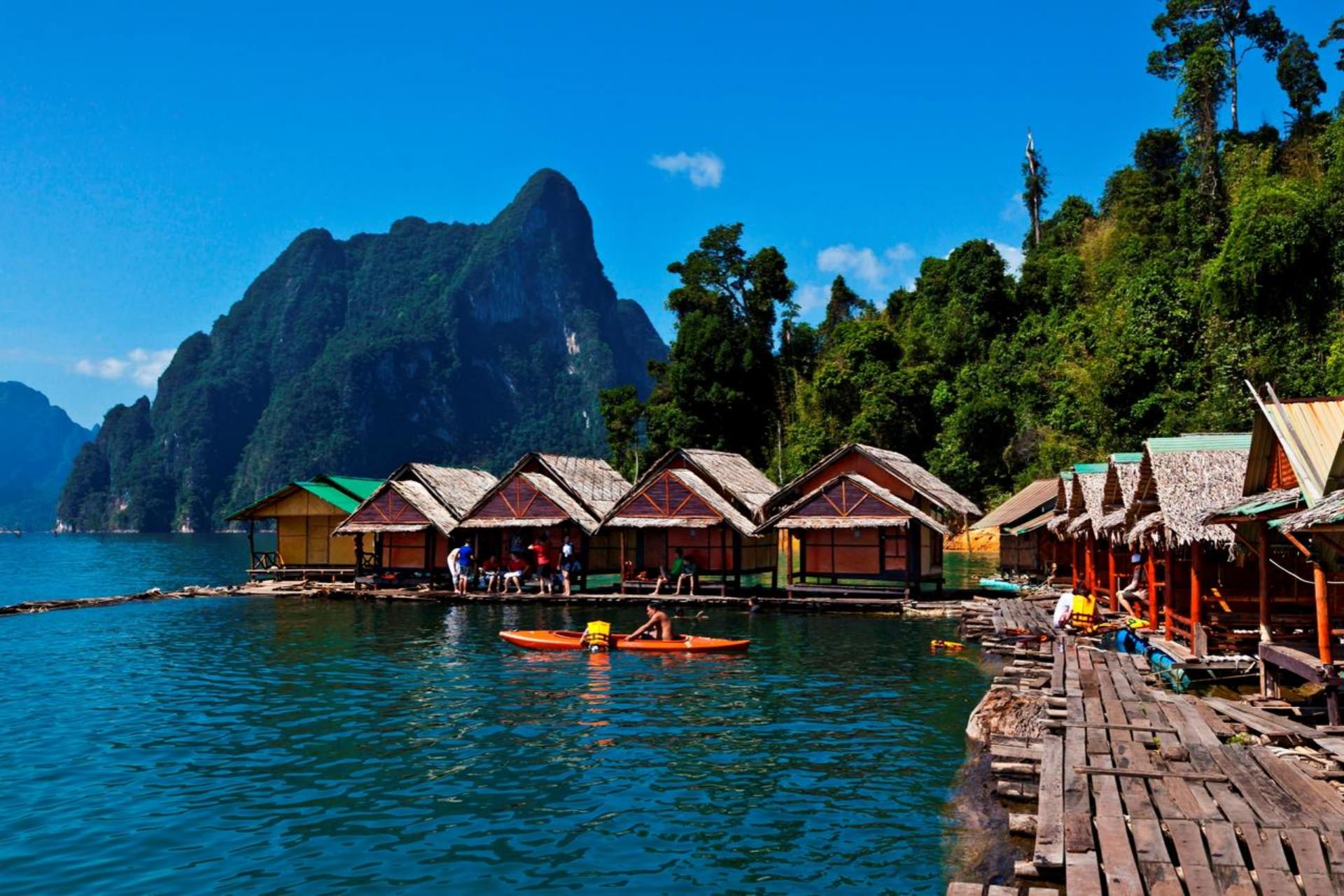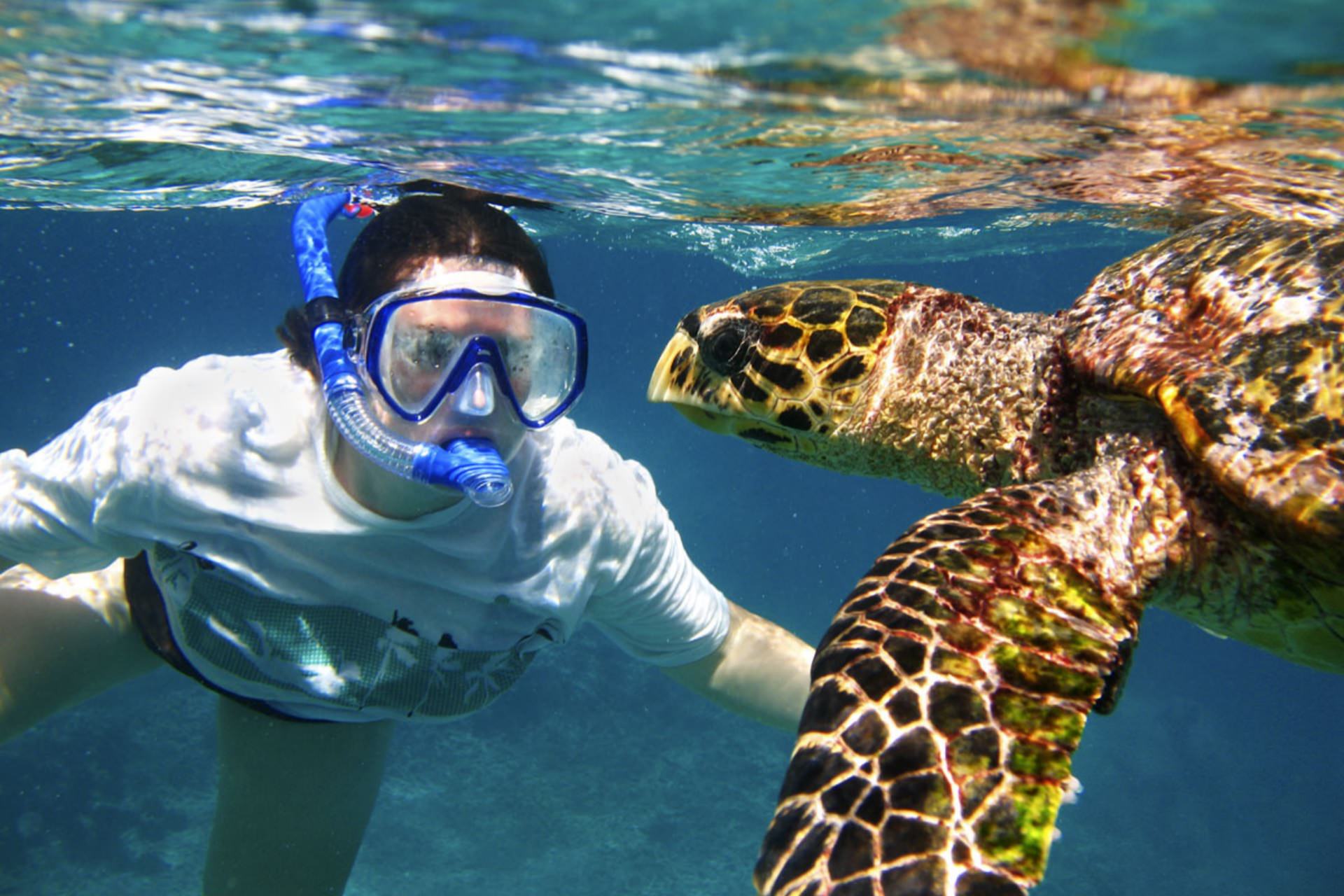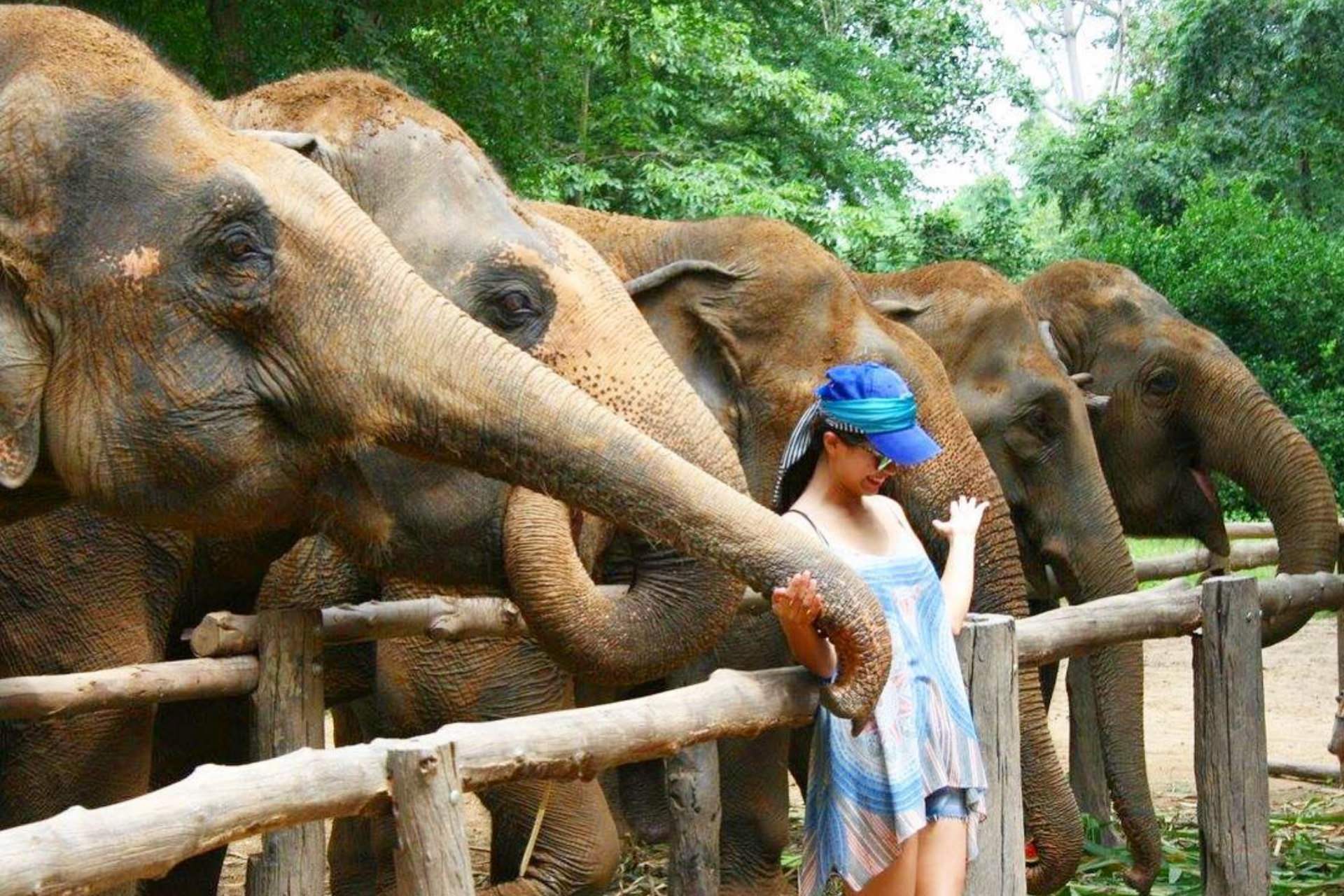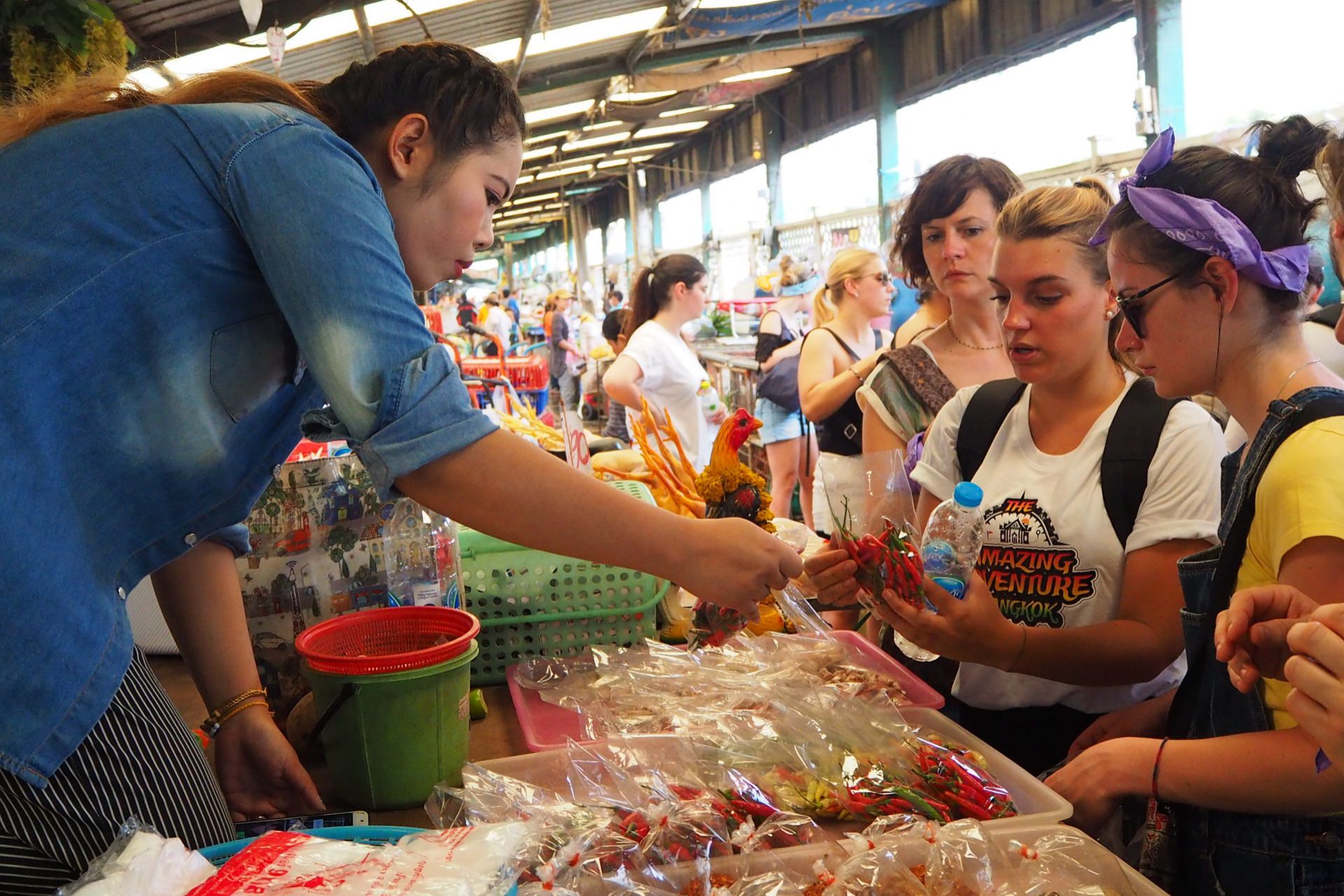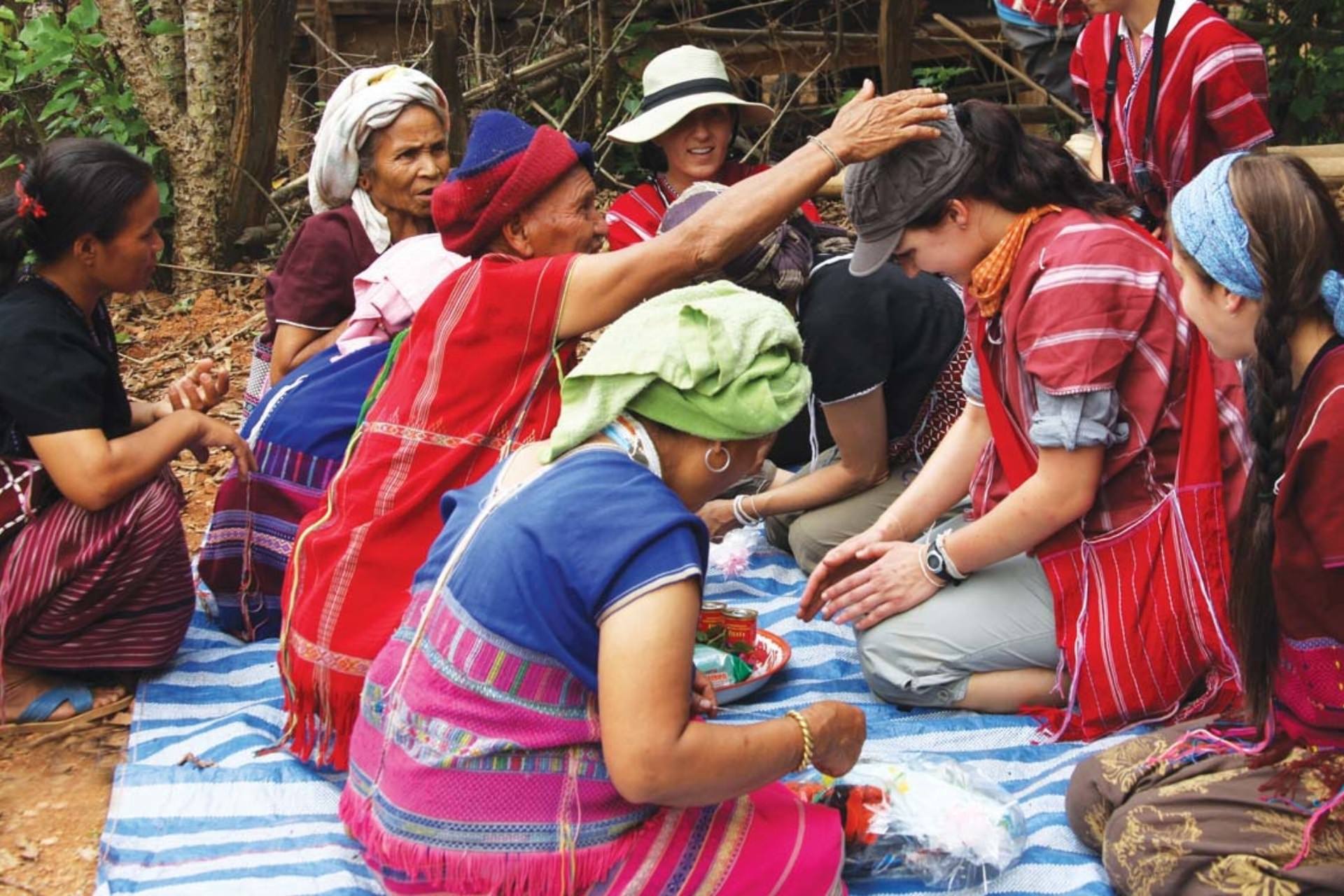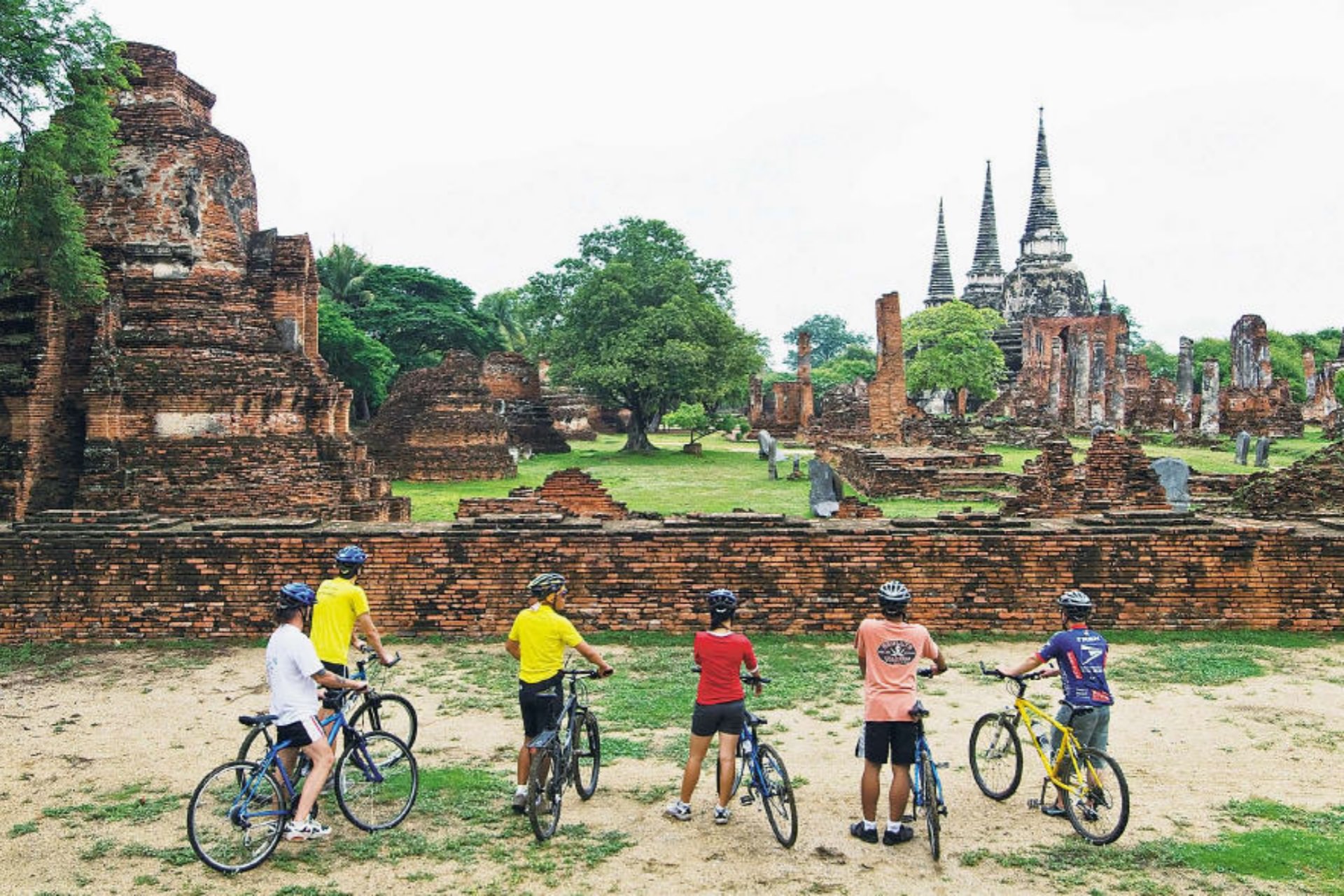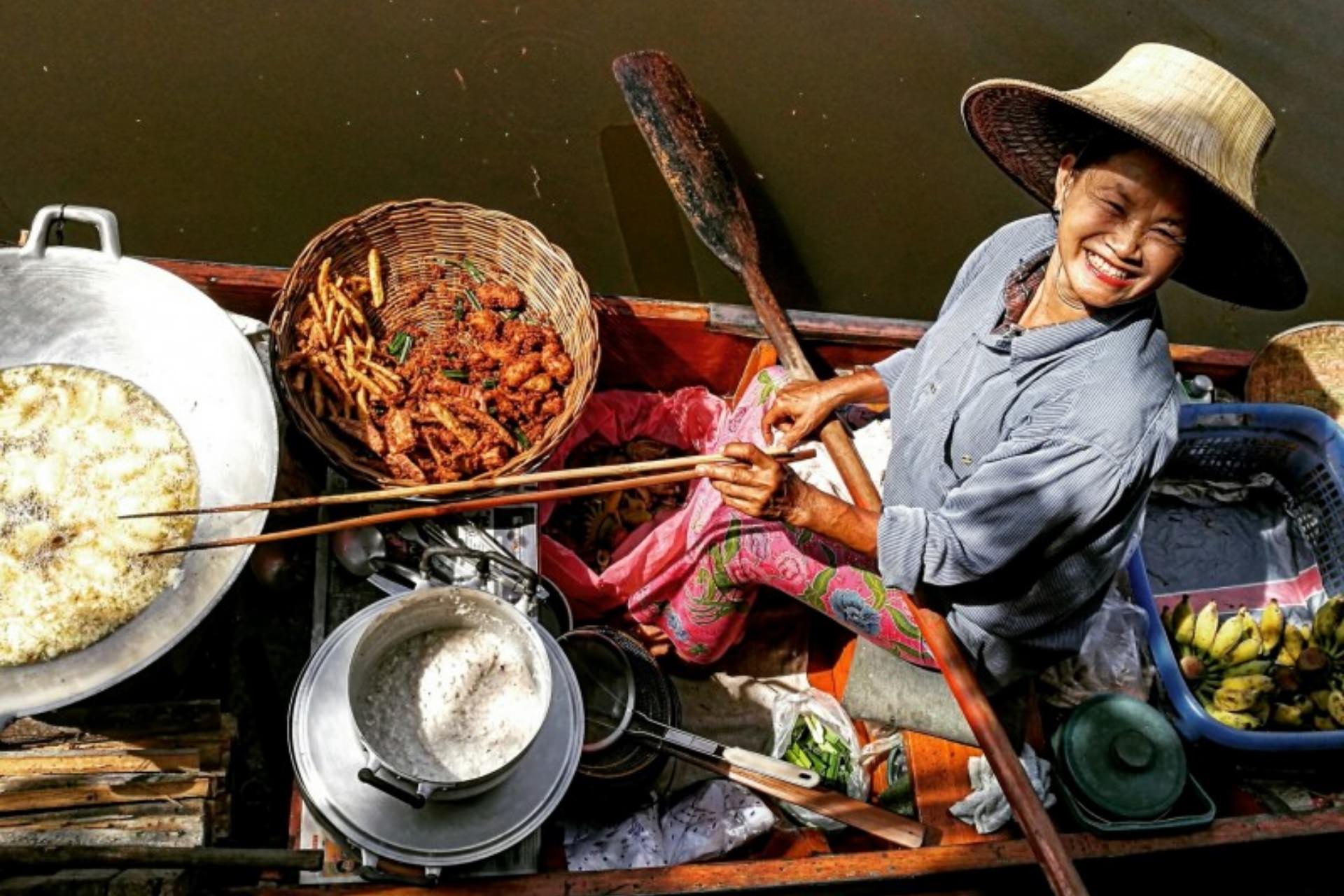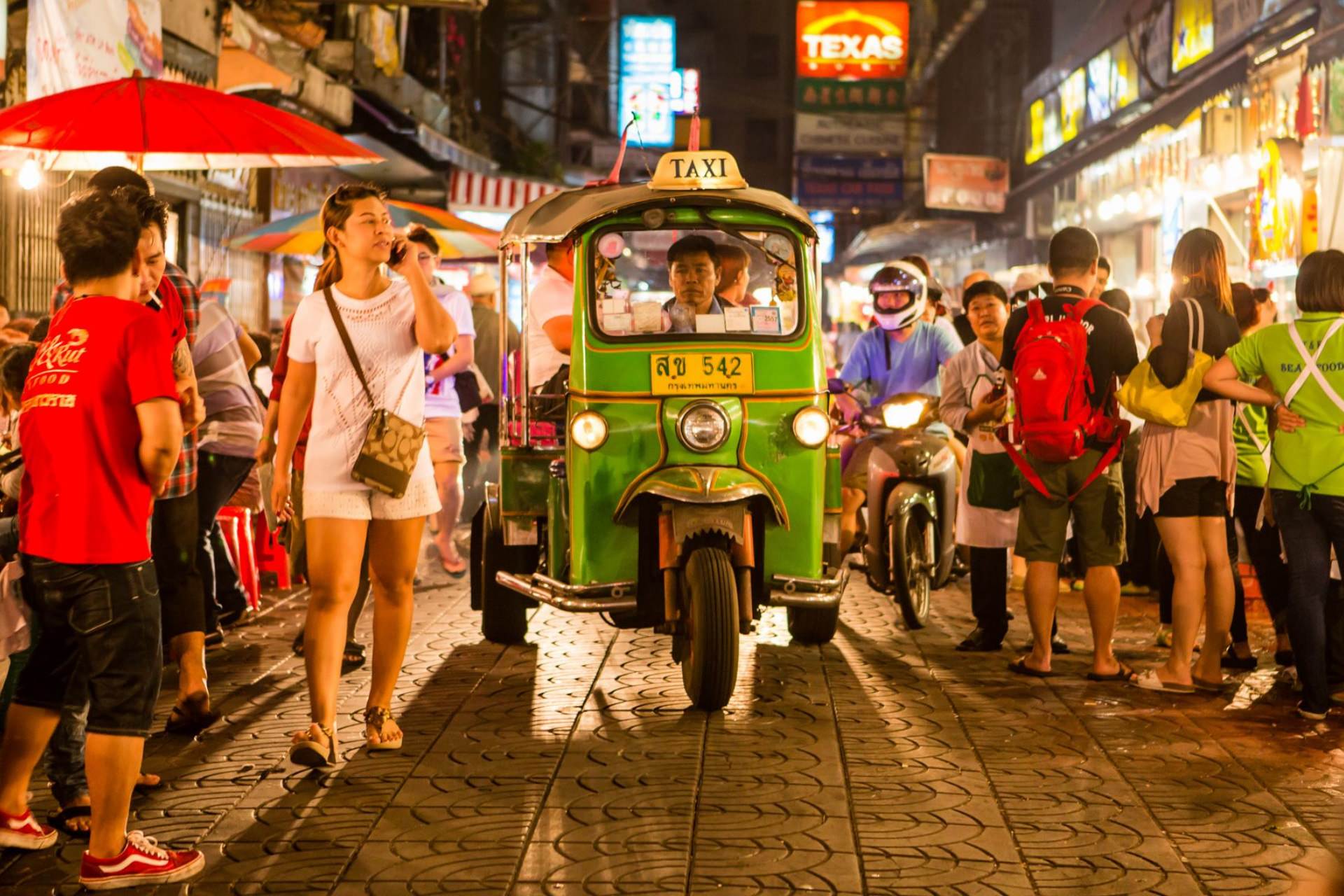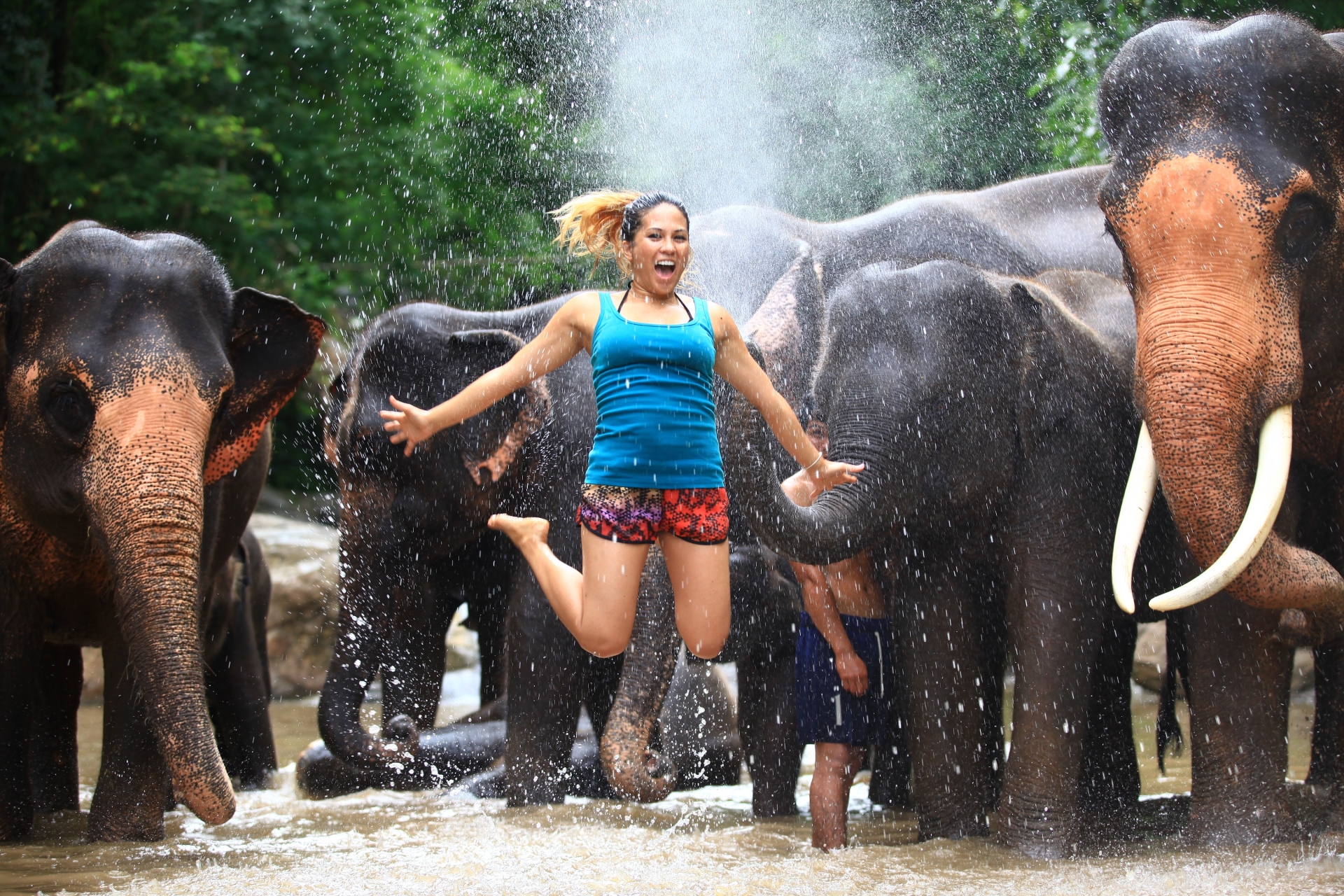Thailand
Volunteer Adventure
About
About Thailand
Prepare yourself for a sensory overload. In many ways, Thailand is the perfect destination for a volunteering adventure, and it offers a wonderfully affordable introduction to South East Asia. The Thai people are so incredibly friendly that Thailand has earned the nickname of the “Land of Smiles”. Thai cuisine is legendary, and everything you experience is infused with the peace and tranquility of Thai Buddhism.
On your Better World Adventure you will experience an intoxicating blend of the best of Thailand. From the huge and colourful capital of Bangkok with its noisy tuk-tuks, magnificent riverside palaces and modern megamalls, to remote hilltribe villages hidden in jungle clad mountains. From the emerald-green rice fields of central Thailand to the breathtakingly gorgeous white-sand beaches in the south.
Thailand is one of the most popular tourist destinations in the world, hosting 8 million visitors each year, and Bangkok is the world’s most visited city. Unfortunately all is not perfect in paradise. Rampant tourism has created problems including pollution and environmental damage, exploitative sex tourism, and unethical wildlife attractions. Poverty and unemployment are widespread, particularly in the rural northeast, and western border provinces struggle with an influx of refugees from Myanmar. Better World Adventures’ inspirational volunteering partners in Thailand are working tirelessly to address many of these issues.
As a volunteer, you may find yourself learning to care for elephants rescued from abusive tourism operations, building simple cottages for disadvantaged villagers, practicing English with refugees, supporting communities through grassroots ecotourism, or participating in marine conservation projects. You will experience the Thai people and their unique culture in particularly personal and intimate ways, making your experience one that you will treasure for a lifetime.
Thailand
Highlights
- Experience the majesty of Asian elephants, up close and personal, while volunteering at world-leading ethical sanctuaries
- Explore the best of Bangkok while competing in team challenges in an exciting Amazing Race style activity
- Trek to stay with remote hill-tribe villagers in Thailand’s jungle-clad northern mountains
- Visit the 600-year-old Khymer ruins of the ancient Thai capital of Ayutthaya
- Spend 3 nights staying on a floating raft-house on one of the world’s most beautiful jungle lakes
- Participate in important marine conservation projects on the beautiful sundrenched islands of the Gulf of Thailand
- Tour the sombre Hellfire Pass where ANZAC prisoners of war toiled and died building the infamous Death Railway
Inclusions
What’s included?
Wherever possible, known costs that will be incurred by all participants have been included. Additional costs are minimal, and mostly personal. No surprises, no significant extras!
- Fully escorted tour with two tour leaders (male and female)
- Comprehensive travel insurance
- Economy class international and domestic air travel
- All airport transfers
- Thailand entry visa
- Thai SIM card with data
- All accommodation (twin or dormitory share)
- 2-3 meals per day
- Professional local guides
- All group travel arrangements within Thailand
- All costs associated with volunteering projects
- Activities and entrance fees as determined on the final itinerary
- Extensive pre-departure orientation
- Souvenir T-shirt
Dates
Departure Dates
Best dates for travelling to Thailand: December – April
Due to monsoon patterns, and agricultural burning, different regions of Thailand suit different times of the year.
Send us a request for a date that suits you.
Every school group tour is created bespoke, according to the time of year, available duration, proposed budget, travel objectives and the number of group members. We will discuss your objectives and requirements with you, and a unique itinerary will be created, ideally with the group members choosing the volunteering they would like to participate in, and the cultural activities and sightseeing they would like to do. We are confident that you will end up with an itinerary that delivers above and beyond your expectations, with exceptional attention to detail, and at a price that is significantly lower per head than other experience providers.
Volunteering
Volunteering Projects
Ethical Elephant Sanctuary (Up to 1 week)
There is something so special about working closely alongside elephants, that part way into your week volunteering in elephant care at an ethical sanctuary, you will realise that you never want the week to stop. You can be sure that the memories of your experience will stay with you for life.
Humans and captive/domesticated elephants have coexisted in Thailand for many centuries. Elephants were used for warfare, logging, transportation, farming, and in cultural ceremonies. Thailand currently has around 3,500 elephants in the wild, and another 3,500 in captivity. Up until thirty years ago, most captive elephants were used for timber logging, but in 1989 the Thai Government banned the practice. This meant that several thousand captive elephants that had been working in the logging industry found themselves out of work. The result of this ‘unemployment’ meant many elephants and their mahout owners were faced with an unenviable dilemma – how to support their elephants, their families and themselves? While it may seem good that captive elephants were no longer used for logging, it brought with it a big problem. The reality is that all captive or domesticated elephants need to earn some form of living in order to be fed. Feeding an elephant is not cheap, as an elephant eats approximately 10 percent of its body weight per day.
In an ideal world all captive elephants would be returned to the wild, but that, unfortunately, is simply not possible. There is no longer anywhere near enough habitat in the jungles of Thailand’s northern provinces for the elephants to return to, due to the rapid rates of deforestation. Some elephant owners, therefore, turned to illegal logging. Others took their elephants to the streets to beg for money. As the number of tourists visiting Thailand has increased, many elephant owners have turned to elephant tourism to help generate an income that could help support their elephants, families and themselves. Elephant tourism in Thailand takes on many different forms. From elephant rides to watching elephants perform in shows, to bathing elephants in elephant camps, to volunteering in one of the elephant sanctuaries located across the country. This is also an area of great debate, however, as what is considered unethical by some tourists, e.g. riding elephants, may not seem unethical to others. In recent years, there has been a tidal shift in attitudes towards elephant tourism among Western tourists to Thailand. Until only recently, visiting elephant shows and riding an elephant were popular activities. Now, these are a big no-no for many. Ethical elephant camps and sanctuaries have instead become the most popular places for visitors to have a personal experience with an elephant.
A hallmark of an ethical elephant sanctuary is that it will promote elephant conservation while helping sustain and support rural communities that have lived alongside elephants for generations. The mahouts (elephant handlers) will have years of experience and will have a bond with the elephants that is respectful and loving. They will not use fear or punishment to manage elephant behaviour. Ethical elephant sanctuaries do not permit commercial riding of the elephants in its care. They do not use bullhooks for behaviour management, and avoid using chains for control. Ideally, elephants will be given access to a forested area where they are free to roam and to take shelter from the sun while eating foods natural to their diets such as bamboo leaves, bark and grass. They will be provided with access to water for drinking and bathing to escape the tropical heat. Elephants are highly social animals so ethical sanctuaries give them the time and freedom to socialize with other elephants. There is currently debate around the practice of permitting volunteers to assist with bathing of elephants. Some of the elephant sanctuaries that Better World Adventures partners with permit volunteers to bathe elephants, others have a complete hand-off policy.
Better World Adventures partners with several highly ethical elephant sanctuaries in different regions of Thailand including:
- Chiang Rai
- Chiang Mai
- Kanchanaburi
- Umphang
- Phuket
At the Elephant Sanctuary project, you will spend up to one week working for the elephants, not the other way around. The elephants freely roam around the sanctuary by day and there will be no elephant riding in the program. You will be spending time assisting experienced mahouts (elephant handlers), who invest their entire lives gaining an understanding of the elephants and how best to care for them. You will have a unique, unforgettable experience learning to care for elephants and bonding with these gentle giants including preparing their food, which typically comes in the form of Bana grass, sugarcane and banana plants. You will gain a first-hand understanding of the management of human-elephant conflict, and the drive to rid Thailand of unethical animal tourism practices.
Project Accommodation: Volunteer accommodation differs depending on the sanctuary that you are volunteering at. In all instances, the accommodation will be basic, but sufficient. The sanctuaries in Chiang Mai and Chiang Rai are large and busy, with volunteers housed in a dormitory-style volunteer village with western style bathrooms. If you are volunteering with elephants and their traditional Karon tribal owners, we will stay in hill tribe homestay bungalows, with very basic conditions, including mattresses on the bedroom floor, and limited cold running water. In Phuket, volunteers are housed in twin-bed African-style safari tents, with a shared bathroom ablution facility.
This project contributes to the following United Nations Sustainable Development Goals:
- #8 Decent Work and Economic Growth
- #11 Sustainable Communities
- #15 Life on Land
Marine Conservation (4-7 days)
Spend up to one week on the beautiful island of Koh Tao in the Gulf of Thailand. Koh Tao is famous for its fantastic its snorkelling and scuba diving and the small island is home to more than 90 dive schools. Annually, over 100,000 students learn to dive in the waters around Koh Tao. As a result of its popularity, it is very important for Koh Tao to manage its marine environment carefully. While staying on the beautiful Sairee Beach, you will volunteer in several community initiatives, including beach clean-ups, learning how the island approaches recycling, and the creation of artificial reefs and the growth of new coral. You will also teach some English to local migrant staff, which will help them in their employment. You will also have the optional opportunity to learn to scuba dive if you are interested. Sairee Beach is also a fantastic place to base ourselves. There are plenty of cafes and shops and activities, great lookouts to visit, but best of all, everyone’s attention is fixed firmly on the beach, which absolutely comes alive in the evenings.
Project Accommodation: While in Koh Tao you will be accommodated in a backpacker hostel in the beachside community of Sairee Beach. The hostel will be modern and very comfortable, with bunk beds, plenty of communal relaxation space, and will be located either directly beachfront, or no more than 100 metres from the beautiful Sairee Beach. Sairee is the most popular beach in Koh Tao, and the small community has many stores, restaurants, cafes, dive schools, laundry, etc.
This project contributes to the following United Nations Sustainable Development Goals:
- #4 Quality Education
- #6 Clean Water and Sanitation
- #4 Life Below Water
Community Construction (1 week minimum)
Join in this ongoing community construction and renovation project in the central Thai province of Singburi. Within this program, the local village heads have selected families who are living in substandard housing and without basic sanitation. Under professional guidance, learn new skills while assisting to repair, rebuild, refurbish and paint village houses and community facilities such as; local medical centres, temples and schools.
Project Accommodation: Your volunteer accommodation will be in one of three volunteer houses in the village of Tha Kham, on the side of the Noi River, near the city of Singburi. Each lockable bedroom sleeps 4 volunteers and is fan cooled. All beds have mosquito nets. Shared bathrooms have western toilets but cold showers. Each house has a communal area where you can eat, relax, or use the free Wi-Fi. Although not directly on site, there are laundry facilities offered by nearby villagers, otherwise you can wash your clothes by hand.
This project contributes to the following United Nations Sustainable Development Goals:
- #11. Sustainable Communities
Fair-Trade Agriculture (1 week minimum)
This is a hands-on opportunity to learn the economic and community benefits of fair-trade agriculture. You will be volunteering with a cooperative of local banana farmers in the Thachang district in central Thailand, for whom agriculture is a way of life. The farmers are supported in part by a government subsidy to ensure they can keep up with the changing market needs. Assist the farmers by providing an extra hand while learning all the steps used to bring their banana crop from planting – to harvest – to prepare for market and export. Daily tasks will include cutting banana leaves, watering, fertilizing, soil conditioning, harvesting, cleaning and packing. You will discover that there is a lot of hard work that goes into cooperative farming, but the results are nothing short of amazing, and directly benefit the local farmers, rather than large multinational corporations!
Project Accommodation: Your volunteer accommodation will be in one of three volunteer houses in the village of Tha Kham, on the side of the Noi River, near the city of Singburi. Each lockable bedroom sleeps 4 volunteers and is fan cooled. All beds have mosquito nets. Shared bathrooms have western toilets but cold showers. Each house has a communal area where you can eat, relax, or use the free Wi-Fi. Although not directly on site, there are laundry facilities offered by nearby villagers, otherwise you can wash your clothes by hand.
This project contributes to the following United Nations Sustainable Development Goals:
- #2 Zero Hunger
- #8 Decent Work and Economic Growth
- #10 Reduced Inequalities
- #11 Sustainable Communities
- #12 Responsible Consumption and Production
Wildlife Rescue Sanctuary (7 days)
Thousands of animals, both domesticated and wild, are kept as pets or used in the tourism industry across Thailand. Our Wildlife Rescue partner project in southern Thailand was started in 2001 and currently has over 600 animals, including gibbons, macaques and orangutans; bears, otters, civets, reptiles, and birds. Most of these have been rescued from horrible conditions or were abandoned after becoming unwanted pets. Some will stay at the centre for a short period and for others it will remain their home for the rest of their lives. The centre requires dedicated volunteers throughout the year. The centre’s aim is to protect wild animals and their habitat from destruction through educating Thai people and tourists about animal welfare and ethical tourism.. As a volunteer you will have the amazing opportunity to work with animals and care for a wide variety of rescued wildlife. You will work in teams to feed and water the animals, clean enclosures, make enrichments, as well as scrubbing animal pools and other maintenance work that needs to be done around the centre. Volunteering is very hard and physically demanding work (up to 9 hours per day), but the reward of seeing the animals enjoying your efforts is priceless.
Project Accommodation: Volunteers stay in European style, concrete and brick bungalows, with two or three people per single-sex room. All rooms have either en-suite or shared bathrooms with a western style toilet and a cold shower. There are 2 communal areas where volunteers eat meals, socialize. Breakfast includes bread, jams and butter, eggs, seasonal fruit, pancakes, milk, tea, coffee. Lunch and dinner are predominantly traditional local Thai cuisine, with Western dinners twice a week. At all mealtimes there are clearly labeled ‘meat’, ‘vegetarian’ and ‘vegan’ options.
This project contributes to the following United Nations Sustainable Development Goals:
- #15 Life On Land
Teaching English (1 week minimum)
For this program, the aims and objectives fall under the jurisdiction of the Thai government. In recent years, the government has placed a continued emphasis on improve children’s prospects by teaching them English. Despite this, English literacy rates in Thailand remain one the lowest in Asia. This ongoing program works with rural school students and provides them with a chance to speak more English. Teaching in rural schools helps students broaden their minds and enjoy a fulfilling experience. You will also gain insight into the Thai education system, as well as a good chance to develop friendships with students and teachers. The program allows a non-formal approach to teaching which means that we do not conform to the local Thai teaching methods or style and you will be free to choose your own way of teaching and may bring new ideas into class. You may create role-play situations, games and other activities that utilise the English language.
Project Accommodation: Your volunteer accommodation will be in one of three volunteer houses in the village of Tha Kham, on the side of the Noi River, near the city of Singburi. Each lockable bedroom sleeps 4 volunteers, and is fan cooled. All beds have mosquito nets. Shared bathrooms have western toilets but cold showers. Each house has a communal area where you can eat, relax, or use the free Wi-Fi. Although not directly on site, there are laundry facilities offered by nearby villagers, otherwise you can wash your clothes by hand.
This project contributes to the following United Nations Sustainable Development Goals:
- #4 Quality Education
Cultural Activities
Bangkok Tuk-tuk Tour (1/2 day)
Spending half a day to explore Bangkok in an iconic Thai tuk tuk can be one of the most fun ways to see the city. These open 3-wheeled vehicles allow you to experience the vibe of the city as you zoom around.
Bangkok E-Scooter Morning Tour (1/2 day)
Venture out onto the streets of Bangkok on an electric scooter in a small group. A fantastically modern way to explore the amazing sights like Chinatown, Muslim community, & unseen temples. Absorb the sounds and smells that the ancient city of Bangkok has to offer as you get up-close and personal on your e-scooter.
Living a Day as a Local (1 day)
Throughout Thailand, Better World Adventures has partnered with a number of NGOs that specialise in highly specific ecotourism projects designed to enable you to meet local people, and live a day in their shoes. All proceeds are returned directly to the community in which you are hosted. Learn wisdom and life lessons from artisans and craftspeople, farmers, fishermen, teachers and tribal elders, in these unique and intimate experiences.
Train Market and Floating Market Tour (1 day)
Explore Thailand’s iconic floating markets on a fun whole day tour and find yourself completely immersed in authentic local life. Visit the Maeklong Railway Market, Wat Bang Kung, Thai Boxing Temple, and the weekend Amphawa Floating Market all in one day! Marvel at local ingenuity at the unique Maeklong Railway Market. Watch the railway tracks go from being completely covered in market stalls, to the shop owners pulling in their wares as a train runs through the market, before the market is set up all over again in a matter of second! Amphawa Floating Night Market is another authentic floating market popular with the locals and is beautiful to explore in the evening. Finally, before the day ends, enjoy a 1 hour classic longtail boat ride to see the fireflies along the river.
Bangkok by Bike and Riverboat (1 day)
Our 5-hour bicycle and boat tour will reveal the different faces of Bangkok. Choose to ride either a mountain bike or an urban cycle as we explore the vast network of side streets, alleyways, and footpaths discovering the essence of what makes Bangkok one of Asia’s most captivating cities. You will find hidden worlds of peace and tranquillity, a picture of “real” Thai life that has remained unchanged for countless decades; an identity of a city that is true to the Thai people, yet largely unknown to outsiders. Starting by biking through Chinatown’s frenetic market with its colorful sights and smells, before we load our bikes onto classic longtail boats to transport onto the Chao Phraya River and then into the maze of small canals that criss-cross rural Bangkok. Discover why this city is often designated “Venice of the East” as our cruise introduces us to the charming lifestyle of local Thais, living on the canals, much as they have for generations. Expect to see classical wooden-framed homes on stilts, mothers doing their daily laundry, and kids splashing away the tropical heat. Enjoy a tasty Thai meal before continuing by bike through luscious green belts as we explore the forgotten plantations of this great city. You will be amazed at how green and relaxing this green belt is, yet so close to the hectic city centre.
Bangkok Amazing Race (1 day)
Divide into teams to race through the streets, parks, temples and hidden spots across Old Bangkok, while finding the clues to riddles and solving challenges and pit stops on the Bangkok Amazing Adventure. Explore local markets, learn to cook Thai food, go through an initiation of Muay thai (Thai Boxing), face our beautiful Thai dancing master and learn from her. Does your team have what it takes to master the cultural challenges and win the Amazing Adventure in Bangkok?
Hellfire Pass and the Death Railway (1-2 days)
The Death Railway, Hellfire Pass, and the Bridge on the River Kwai makeup one of the most significant ANZAC WWII memorials in Asia and is always a sobering and emotional tour for New Zealand students. Located in Kanchanaburi, 260km northwest of Bangkok, the Death Railway was built in 1943 by 60,000 New Zealand and Australian Prisoners of War alongside 200,000 Asian labourers, who had been captured by the Japanese forces. The 415km railway was designed to supply Japanese forces fighting in Burma/Myanmar. Under horrific conditions, the prisoners completed the building of the entire railway in just over 20 months, however more than 100,000 prisoners of war died during the construction. Conditions were brutal with prisoners working for 15-18 hours a day on starvation rations, in the crippling heat and humidity of the Thai monsoon.
Hellfire Pass is an unfinished railway cutting, where thousands of people lost their lives while working in harsh conditions. The name comes from the sight of the laborers working during the night. Their shadows and the torchlights resembled scenes from hell.
On this tour we will travel to Kanchanaburi, where we will walk the old railway line through Hellfire Pass, while listening to the narration of a particularly good audio tour. We will also visit the famous Death Railway bridge over the river in Kanchanaburi. Overnight we will stay in a rafthouse floating on the Kwai River and have the chance to go scenic kayaking. While this tour can be done in one long day from Bangkok, we strongly recommend taking the two-day, overnight option.
Ayutthaya – Ancient Siamese Capital (1-2 days)
Three hundred years ago the ancient city of Ayutthaya was the largest city in the entire world, with more than one million residents. It was perfectly located on the trade routes between China, India and Malaysia. For 400 years Ayutthaya stood as the capital of the country of Siam, and one of the world’s wealthiest and most cosmopolitan cities, replete with gilded temples and treasure-laden palaces. But, like all great cities, terrible tragedy and jealousy caused it’s downfall. For 200 years a war had been fought between the kingdom of Ayutthaya and the neighbouring Kingdom of Burma. In 1767 the Burmese invaded the island city of Ayutthaya, burning the city to the ground and brutally killing over 80% of its inhabitants. In the aftermath, the port city of Bangkok, 85km to the south, became Thailand’s capital. Although Ayutthaya is now just a fraction of the grandeur that it once must have been, dozens of enigmatic temple ruins remain and offer a tantalizing glimpse into Ayutthaya’s glorious past. The city was awarded UNESCO World Heritage status in 1991.
Ayyuthaya is a particularly laid back city, with many of the most significant ruins surrounded by a complex of rivers and canals. We will stay at a fantastic backpacker hostel, right in the centre of Ayutthaya Island, next to the vibrant night market, and take boats and tuk-tuks to explore some of the most significant of the of the city’s ancient temples, which remain some of the most spectacular in Thailand.
Rafthouse and Jungle Trekking in Southern Thailand (3-4 days)
Sometimes, its the off-the-beaten track places that no-one seems to have heard about that catch you off guard, because they are so fantastic and yet so secret! One such location in central southern Thailand is Khao Sok National Park, one of the world’s oldest ecosystems. The jewel of Khao Sok is the huge Cheow Larn hydro lake, which is quite possibly one of the most beautiful places you have ever seen, with over 100 islands and spectacular towering limestone cliffs dripping with ancient jungle. There will be times when you are on the lake that you swear you are on the Pandora set for the next Avatar movie!
We will travel by boat to the far reaches of the lake, where we will spend a couple of nights staying in a floating rafthouse. When darkness falls at Khao Sok the jungle comes alive. The calls of gibbons penetrate down from the roof of the jungle, the chirping of cicadas can be heard anytime and anywhere. Strap on your headlamp and join our guide for a night safari where you might spot bats swishing through the sky and owls perched in the trees. Be surrounded by the nightly concert of the cicadas and huge grasshoppers. Keep your eye out for the world’s smallest deer, a civet cat, and maybe even a slow loris!
Jungle trekking in the National Park is some of the best hiking in Thailand. Elephants, bears, tapirs and tigers live hidden in the dense jungle. Although it is unlikely you will see such large wildlife, you will hike to waterfalls, and swimming holes and explore caves and towering bamboo forests. You might encounter rare plants, including the giant Rafflesia flower. Kayak on the lake or down a river while watching monkeys playing in the trees, brightly colored kingfishers, and maybe even snakes snoozing in the trees above. Totally off-the-grid, a visit to Khao Sok will very likely be one of your Thailand highlights.
Conservation Camp (3-7 days)
In the jungles of western Thailand, Better World Adventures had partnered with a fantastic rustic and privately-owned conservation project and eco-lodge, that is located between a major river and Thailand’s oldest natural wildlife sanctuary. The land has been allowed to return to its virgin state to enable plants to flourish and to create a wildlife corridor where animals including elephants, buffalo, deer and wild boar can move freely from the sanctuary to a nearby river. The wider aim of the conservation project is to better understand how humans can co-exist with nature with the least possible damage.
Accommodation will be in rustic bamboo bungalows in the project’s headquarters, which are accessible only by boat to reduce its environmental footprint and enable you to experience life truly in the lap of nature. Most of the project is off-grid using solar power, and rainwater is that is harvested for use. V
The Reserve works primarily as an education centre for those interested in learning about nature and sustainability. Reserve staff work with visitors and the local farming communities to enhance understanding and acceptance of sustainable conservation practices. Areas around the reserve are full of sugarcane and tapioca farms and wild elephant commonly raid these plantations, so working with local farmers to teach them about Human-Elephant Conflict and how to keep wildlife away from their crops without harming the animals is an ongoing project. The centre also serves as a Snake Rescue and Education Centre, by helping local authorities deal with snakes which have wandered into villagers houses.
Reserve staff are experts at wildlife tracking, organic farming, wood construction, fishing, honey collection and jungle craft. While visiting the reserve you may take part in activities including overnight jungle camping while tracking wild elephants, setting up waterhole salt licks, learning jungle survival skills, or go for scenic river floats to observe riverside wildlife.
Scuba Diving – Snorkeling or Open Water SCUBA Diver qualification (4 days)
Koh Tao is the largest trainer of scuba divers in the world, with more than 100,000 students gaining their internationally recognised dive qualifications on the island each year. As an optional activity, if our group is volunteering on the Marine Conservation project in Koh Tao, it will be possible for you to gain your SSI or PADI Open Water Dive Qualification during your stay. The qualification is taught over four days, with classroom and pool tuition, followed by four ocean dives of increasing complexity. Better World Adventures has negotiated with our Koh Tao partners to ensure that the additional cost of gaining your qualification is minimal, and that you will still be able to take part in most of the Marine conservation activities being undertaken by other non-diving members of the group. This is a great opportunity to gain a dive qualification that can be used throughout the world for the rest of your life. The dive course is thorough, student teacher ratios are very small (4:1), safety standards are very high and equipment is top quality. To register for the Scuba Diving Open Water qualification you must first complete a Diver Medical Questionnaire and be able to swim 200m. If you are unable, or do not wish to scuba dive, there is also a huge amount of fantastic snorkeling at Koh Tao.
Hill Tribe Eco-trekking in Northern Thailand (4-5 days)
The jungle-clad mountains of north-western Thailand along the Myanmar and Laos borders are home to of up to one million hill-tribe people, most of whom originally migrated from neighbouring countries such as Laos, Myanmar or China and set up their remote and isolated villages in the mountains around Chiang Mai, often many hours walk from the nearest road.
The hill tribes are made up of seven major ethnic minority groups, each maintaining their own unique culture, dress and language for hundreds of years. The largest hill-tribe population is the Karen, from Myanmar, followed by the Hmong from Southern China. Other significant hill-tribe ethnic groups include the Akha, the Lisu, the Lahu, the Mien, and the Palaung. The hill-tribe villagers live on very little money and practice subsistence farming to survive, producing tea, coffee, different types of fruit and of course rice. With the popularity of trekking, many hill-tribe communities are happy to have tourists visit them, buy their crafts, learn about their culture, sleep in their homes, and support them economically.
Better World Adventure’s has two partners offering hill tribe trekking, in the mountains out of either Chiang Mai or Chiang Rai in northern Thailand. Both are focused on ethical tourism and sustainability. They go to great lengths to protect the indigenous mountain communities from high-volume tourism that can damage vulnerable communities. They have seen first-hand how education and training local communities in sustainable tourism can lift people out of poverty. As well as guided eco-treks, they also teach skills development in homestay management and guide training to the ethnic minority villages that we will visit, help empower the communities by giving villagers opportunities to make an income without having to leave their homes and move to the cities.
We will spend up to 4-5 days trekking to remote hill-tribe villages in north-western Thailand. Where distances between villages are too great, we may travel some of the way in the traditional Thai truck/mini-bus known as a songthaew. The villages that we visit are in non-touristic areas that are not accessible to tourists or the general public and only occasionally see other trekkers. The financial benefits of our trekking will directly benefit the communities that we visit. As you trek through jungle, rice paddies and rural scenes, your local guide will teach you about edible fruits and nuts along the trail, various flora and fauna, the history of the region and explain more about the different cultures of the hill-tribe communities we will encounter. In the evenings you will stay in mountainside hill tribe villages where you will have an opportunity to learn about the villager’s way of life. Your accommodation will be in the basic bamboo huts of a hill-tribe homestay, or in a village guest bungalow in the mountains. Expect conditions to be extremely basic, possibly sleeping on Thai style mattresses on grass mats on the hut floor.
Itinerary
Sample Northern Thai Itinerary
- Day 1 - "SAWASDEE” BANGKOK
- DAY 3: BANGKOK BY BIKE AND BOAT
- DAY 4: AMAZING RACE BANGKOK
- DAY 5-6: THE DEATH RAILWAY AND HELLFIRE PASS
- DAY 7: A DAY IN THE LIFE (OF A SILK MANUFACTURER)
- DAY 8-9 ANCIENT CAPITAL OF AYUTTHAYA
- DAY 10-11 CHIANG MAI
- DAY 12: A DAY IN THE LIFE (OF A HILL TRIBE CHEF)
- DAY 13-18: ELEPHANT SANCTUARY VOLUNTEERING
- DAY 19-21: HILL TRIBE ECO-TREKKING
- DAY 22: – BACK TO BANGKOK
- DAY 23: MARKET, MARKET, MARKET
- DAY 24: HOMEWARD BOUND
Day 1 – 2: “SAWASDEE” BANGKOK
We arrive in Bangkok from New Zealand, checking into our backpacker hostel accommodation. In the evening we travel by iconic tuk-tuks to visit one of Bangkok’s many colourful and crowded night markets for shopping, and our first deliciously spicy Thai dinner.
DAY 3: BANGKOK BY BIKE AND BOAT
The Chao Phraya River cuts through the centre of Bangkok, and is used like a superhighway, with its continuous stream of boats, water taxis, and rice barges. Many of the most famous Bangkok monuments and temples line the riverbanks, so we spend the day exploring the oldest areas of the city by bicycle and long-tailed river boat.
In the evening, we venture out of the city, visiting a floating market and being dazzled by the beauty of millions of fireflies.
DAY 4: AMAZING RACE BANGKOK
You’ve watched the crazy chaos of the Amazing Race on TV, now dive into your own day of pit stops and challenges, as we divide into teams and compete in our own Bangkok Amazing Race Special Stage. Use a variety of modes of transport we criss-cross Bangkok under the watchful eye of our expert guides while solving cultural challenges. You might be shopping for mystery foods in markets, or learning the art of Muay Thai boxing, or whipping up a traditional Thai meal. You’ll see Bangkok behind-the-scenes, and have a great time doing it. May the Best Team Win!
DAY 5-6: THE DEATH RAILWAY AND HELLFIRE PASS
The Death Railway, Hellfire Pass, and the Bridge on the River Kwai make up one of the most significant ANZAC WWII memorials in Asia. We travel to Kanchanaburi, 260km northwest of Bangkok, where the Japanese Army forced 60,000 Kiwis and Australians and 200,000 Asian prisoners to build a railway to Burma/Myanmar in 1943. Conditions were brutal and more than 100,000 prisoners died during construction as a result of starvation and exhaustion. We will walk the railway line through Hellfire Pass and visit the ANZAC war memorial, staying the night in floating rafthouses on the Khwae River.
DAY 7: A DAY IN THE LIFE (OF A SILK MANUFACTURER)
Today we get to hang out with Bangkok locals, while they introduce their lives to us. Spend the day with workers in the Baan Krua Nua silk manufacturing community, learning how traditional Thai silk is made. A highlight of the day will be a visit to the Jim Thompson Silk Museum, which celebrates the life of a famous Thai silk merchant who mysteriously disappeared while out walking in 1967. In this great NGO-run project, the proceeds of your visit are returned directly to the residents of Baan Krua Nua.
DAY 8-9 ANCIENT CAPITAL OF AYUTTHAYA
We travel north of Bangkok to the ancient Siamese capital of Ayutthaya, the largest city in the world until it was burnt to the ground in 1767. Now protected as a UNESCO World Heritage Site, the ancient city of Ayutthaya has dozens of fantastic ruined temples which we will explore by tuk-tuk and bicycle.
DAY 10-11 CHIANG MAI
From Ayutthaya we take the overnight train to Thailand’s second-largest city of Chiang Mai in the far north. Chiang Mai is a land of misty mountains and colourful hill tribes, a playground for seasoned travellers, a paradise for shoppers and a delight for adventurers. Founded in the 13th century the city is home to hundreds of elaborate Buddhist temples, artisan communities, and fantastic markets. We spend a day exploring by tuk-tuk, before taking a magical night tour of some of the most impressive hilltop temples.
DAY 12: A DAY IN THE LIFE (OF A HILL TRIBE CHEF)
As we did in Bangkok, today we hang out with Chiang Mai locals who share their lives and stories with us. Learn about hilltribe culture while cooking up an 11-dish buffet at Thailand’s only specialist Akha Hill Tribe Cooking School. In this great NGO-run project, the proceeds of your visit are returned directly to the residents of the Akha community.
DAY 13-18: ELEPHANT SANCTUARY VOLUNTEERING
We will live for a week in a Karen hilltribe village in the mountains south of Chiang Mai, where the tribespeople have been traditional owners of elephants for generations. As volunteers for a week, you will be signing up to be of service to the elephants and the community involved in raising them. You will learn elephant husbandry, how to aid elephants with daily tasks, inspect them for disease, monitor their health, and observe their behaviour. The project also works to enhance the lives of the hilltribe community, who live with very little and lead very simple lives. Expect the work to be difficult, dirty, and often un-glamorous but in return you will be treated to an intimate experience with elephants in spectacular surroundings.
DAY 19-21: HILL TRIBE ECO-TREKKING
After a week living with the Karen hill tribe, let’s get out and explore the area. Better World Adventure’s partners Ethnic Hill Tribes EcoTrails are specialists in leading authentic, off-the-beaten-track guided treks to isolated visit hill tribe villages in the forests around Doi Inthanon , and to fully explain the culture of northern Thailand hill tribes. They are also passionate about sustainable tourism and providing employment and income for local tribespeople.
DAY 22: – BACK TO BANGKOK
Back onto the overnight sleeper train bound for Bangkok, with a free day on arrival. Revisit areas of Bangkok you know, or explore something new in this fantastic city.
DAY 23: MARKET, MARKET, MARKET
Before departing, what better way of shopping ‘til you drop than exploring three of the most unique markets on the planet. We start with the Maeklong Railway Market, bizarrely built across the tracks of a working railway line, before having lunch at the Amphawa Floating Market, where the stallholders and cooks jostle their small boats for the best position on a crowded canal. Finally, we dive into the absolute mother-of-all-markets, the Chatuchak Weekend Market. Chatuchak is the world’s largest weekend market with over 15,000 stalls, where anything and everything Thai is available. It is truly Thai souvenir heaven!
Day 24: Homeward Bound
Itinerary
Sample Southern Thai Itinerary
- DAY 1 - 6: SIMILAR TO NORTHERN ITINERARY
- DAY 7: A DAY IN THE LIFE (OF A THAI WORKER)
- DAY 8-9: A DAY IN THE LIFE (OF A CRAB FISHERMAN)
- DAY 10-16: MARINE CONSERVATION PROGRAM – KOH TAO ISLAND
- DAY 17-20: KHAO SOK JUNGLE EXPERIENCE
- DAY 21-27: ELEPHANT CARE VOLUNTEERING PROJECT
- DAY 22-23: – PHUKET
- DAY 24: HOMEWARD BOUND
DAY 1 – 6: SIMILAR TO NORTHERN ITINERARY
DAY 7: A DAY IN THE LIFE (OF A THAI WORKER)
Today we get to spend time with Bangkok locals, while they introduce their lives to us. Spend the day meeting workers in the Khlong Toei slum district. Discover the humanity, humour and hospitality of the Khlong Toei residents, listen to their stories, and learn how to make the fragrant flower garlands that are sold on street corners and outside temples. In this great NGO-run project, the proceeds of your visit are returned directly to the residents of Khlong Toei.
DAY 8-9: A DAY IN THE LIFE (OF A CRAB FISHERMAN)
Travel to Chumphon on the southeast coast, where you spend a day and night in a sea gypsy village on a sandbank where the Bang Son Canal meets the sea. Spend an afternoon snorkelling at Kwai Island, before learning how the locals fish for squid and set crab pots in the evening, while watching fireflies light up the night sky. Enjoy all the seafood that you can eat, and try the famous Kopi Luwak – the most expensive coffee in the world.
DAY 10-16: MARINE CONSERVATION PROGRAM – KOH TAO ISLAND
We depart from Chumphon by ferry to the beautiful island of Koh Tao in the Gulf of Thailand. Koh Tao is famous for its fantastic its snorkelling and scuba diving. While staying on the beautiful Sairee Beach, you will volunteer in several community initiatives, including beach clean-ups, learning how the island approaches recycling, and the creation of artificial reefs and the growth of new coral. You will also teach some English to local migrant staff, which will help them in their employment. While on the island you will also have the optional opportunity to learn to scuba dive.
DAY 17-20: KHAO SOK JUNGLE EXPERIENCE
Off-the-beaten track in central southern Thailand is Khao Sok National Park, one of the world’s oldest ecosystems. The jewel of Khao Sok is the huge Cheow Larn hydro lake, which is quite possibly one of the most beautiful places you have ever seen, with over 100 islands and spectacular towering limestone cliffs dripping with ancient jungle. We travel by boat to the far reaches of the lake, where we will spend a couple of nights staying on a floating rafthouse. Spend a couple of days kayaking on the lake, trekking in the jungle, hiking to waterfalls, caves and towering bamboo forests. Totally off-the-grid, a visit to Khao Sok will very likely be one of your Thailand highlights.
DAY 21-27: ELEPHANT CARE VOLUNTEERING PROJECT
From Khao Sok we travel to the huge southern island of Phuket, where we spend a week volunteering at an ethical elephant sanctuary project. Elephants do not exist in the wild in Phuket, so all the elephants in the sanctuary have been rescued from abusive owners, and lives of hardship carrying tourists on safari, begging in the streets, or performing tricks for money. You will be spending time assisting experienced mahouts (elephant handlers), while learning to care for elephants and bonding with these gentle giants by swimming with them, bathing them and preparing their food, which typically comes in the form of Bana grass, sugarcane and banana plants. You will gain a first-hand understanding of the drive to rid Thailand of unethical animal tourism practices.
DAY 22-23: – PHUKET
Our last days in Thailand will be spent in the city of Patong, on Phuket’s west coast. Spend your days relaxing on the white sand beach, and doing last-minute shopping in Patong’s bustling night market and modern shopping malls, before finally departing for New Zealand from Phuket’s international airport.
Day 24: Homeward Bound
Bangkok
Chiang Mai
Chian Rai, Thailand
Singburi, Thiland
Ayutthaya, Thailand
Koh Tao, Thailand
Khao Sok, Thailand
Kanchanaburi, Thailand
Phuket, Thailand
Request more information!
Call Us
+64 21 2336367

